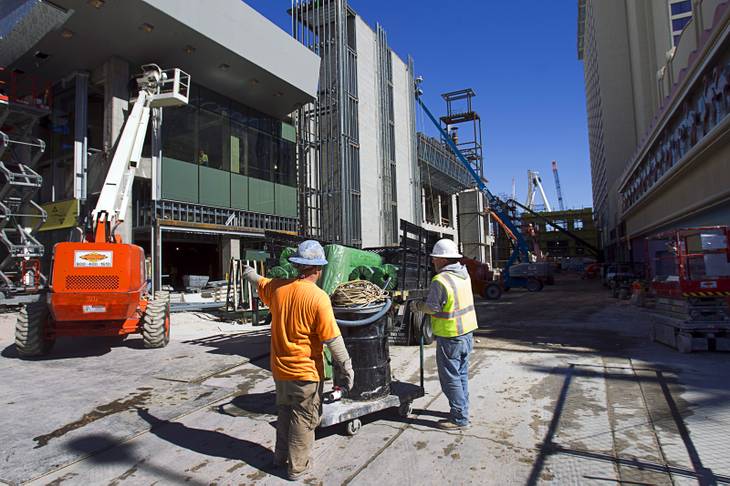Las Vegas’ most lucrative areas of law have fluctuated over time.
During Nevada’s earliest years, before other municipalities followed suit and loosened their marriage laws, many local attorneys carved out very comfortable livings handling uncontested divorces (Clark Gable and Ria Langham’s 1939 split helped Las Vegas eclipse Reno as the nation’s divorce capital).
As the casino industry took hold of the state, gaming law became the practice du jour. Attorneys cashed in on the growing field, creating niche practices and trying to land work with major gaming companies.
With time, however, many casino companies turned to in-house lawyers for counsel, and computers replaced attorneys in handling uncontested divorces.
More recently, the sour economy dictated the largest sector of growth in Las Vegas’ legal industry. After the economy tanked, firms hired bankruptcy lawyers in spades, said Walt Cannon, an attorney at Olson, Cannon, Gormley, Angulo and Stoberski.
Now, with the market showing signs of renewed vigor — new projects are popping up on the Strip and Zappos CEO Tony Hsieh is working hard to revitalize downtown, in large part by funding technology startups — it’s likely Nevada’s legal landscape will see another shift.
Intellectual property and commercial real estate law are being touted as the new frontiers.
Real estate rumblings
“If the economy is recovering, there will be a lot more real estate deals going on, and I am betting the legal community will find plenty to do there,” Nevada historian Michael Green said. “The comeback ought to resemble the run-up to the comedown.”
Christine Bricker, who leads the real estate group at Gordon Silver, said she is seeing the first sparks of a potential turnaround.
After years of focusing on how to restructure debt, Bricker finally is seeing more new deals.
“That’s when you start smiling again,” Bricker said. “I think we’re coming back — slow, but we’re coming back.”
Construction resumed this year on Desert Blue, a timeshare development just west of Interstate 15 that sat unfinished for more than four years.
Last month, developers bought the unfinished ManhattanWest, an office, retail and residential project on Russell Road near the 215 Beltway, and unveiled plans to complete it under a new name, the Gramercy.
In early March, Malaysia’s Genting Group bought the failed Echelon resort on the Strip with plans to turn it into Resorts World Las Vegas, a multibillion-dollar, Chinese-themed megaresort.
And in September, developers of the Shops at Summerlin announced the stalled retail hub was back on track with Macy’s as an anchor tenant.
Commercial real estate deals are much like residential deals in that both involve contracts, either for a sale or a lease. But commercial transactions typically are far more complex. They usually involve much larger sums of money and more liability. Details need to be negotiated and loads of documents need to be reviewed.
In residential deals, the courts provide built-in protections for buyers. In commercial deals, judges expect both parties to be knowledgeable and understand the terms involved. The courts take a neutral approach to commercial transactions, which is why proper legal representation is key.
Commercial buyers also are expected to perform their own due diligence and thoroughly investigate deals before following through with them. Code violations or environmental hazards, for example, could be assumed by a new owner.
While national and international firms often corner the market on work involving large casino companies, smaller firms still can find a niche representing subcontractors and suppliers, said attorney Justin Watkins, a construction lawyer at Atkinson & Watkins.
Watkins anticipates an uptick in construction law as the economy continues to pick up, although he predicts the upswing will trail general market improvements by about two years. Many developers still want to wait for a more robust rebound before they start acquiring land and building.
Also, construction litigation typically arises well after projects have been planned, designed, permitted and started, Watkins said. Owners, contractors and suppliers tend to get along in the early stages. It’s usually when changes are requested and budget crunches arise that people start to become disgruntled.
The idea industry
When Scott Weide and Chad Miller founded their intellectual property firm, Weide and Miller Ltd., in the late ’90s, they saw an opportunity to get in at the ground level of an emerging industry.
There wasn’t much intellectual property law being done in Las Vegas. The pair figured that if they were patient, the industry would grow around them.
While the intellectual property sector in Las Vegas continues to fall short of cities such as New York, Los Angeles and San Francisco, the market is steady and poised to grow, particularly given the city’s advances in online gaming. Nevada was the first state in the nation to legalize Internet gambling, and even as other jurisdictions follow suit, Nevada is expected to maintain a leading edge in the field.
Las Vegas is a heavyweight in the gaming world, said Bo Bernhard, director of UNLV’s International Gaming Institute, and much of gaming involves intellectual property. Companies want to protect the games, brands and technologies they develop.
“Experience matters, and generations of successful game design matters,” Bernhard said.
Competitors constantly are nipping at our heels, and the gaming industry has become more aggressive and sophisticated in protecting its patents, Weide said. Patent law has experienced an uptick over the past 10 years, in part because of the city’s growth, in part because of residents’ increased savviness and in part because of the economy.
Jennifer Ko Craft, head of the intellectual property and entertainment department at Gordon Silver, said that during the recession, much of her work focused on helping clients try to raise revenue by enforcing patent infringements. Now, she is seeing people cultivate ideas that they want to protect.
The downtown scene is bolstering the gains.
Dozens of entrepreneurs — many with funding from Hsieh and his Downtown Project — have flocked downtown to pursue ideas, invent technologies and start businesses.
Online gaming is expected to expand the industry even further as new companies enter the field and develop brands and concepts that need protection.
The nature of the Internet simplifies theft and infringement. On the Web, games and ideas are distributed worldwide and are ripe for picking by anonymous hackers.
Online gaming also has the potential to encourage increased patent litigation, as lawyers could begin arguing that broadly written patents about how Internet transactions work apply to gambling.
There also is the potential for a boom in licensing work if companies decide to license their brands. Partnering with a single server that hosts multiple websites could save companies money while maximizing their player bases.
As online gaming expands nationally, Las Vegas has the potential to become an intellectual property hub, said Greg Gemignani, who specializes in intellectual property and gaming regulation at Lionel Sawyer & Collins. But for that to happen, the city needs to grow its technology industry and research base. Gaming alone won’t make the city a premier intellectual property destination, especially given competition from cities with a diverse base of industries working to churn out cutting-edge innovations.
Regardless, the field of intellectual property law is on the rise in Las Vegas, so much so that experts predict there will be more demand than the field can supply, Craft said.
Patent lawyers are few and far between. Because of the field’s complexity, attorneys can’t dabble in the specialty.
Rather, they must pass a specialized bar exam and have a substantial background in science, since they must be able to analyze the workings of innovations.

